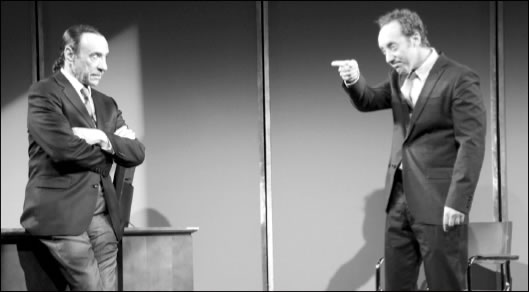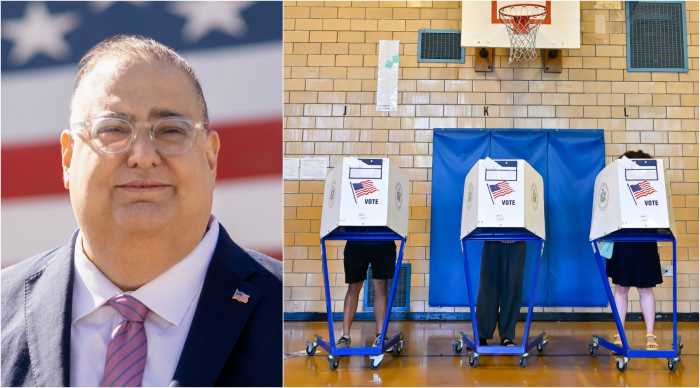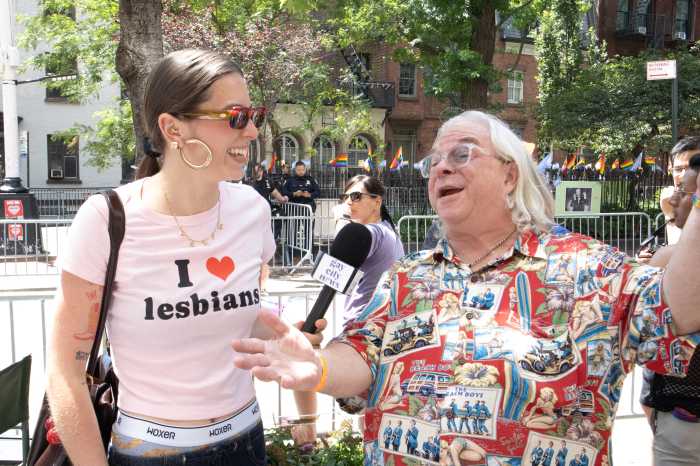BY JERRY TALLMER
Multitalented actor multitasks, with multiple roles
You’re either a boss or a bum.
Sounds like a song by Frank Loesser, and it’s a sure shot that F. Murray Abraham has been in more than one show by Frank Loesser, one time or another. He’s been in everything else in a non-stop stage and screen career that now stretches back close to 50 years.
Here, let him sum it up, tersely, compactly, wittily:
NYC debut as Macy’s Santa, street theater, children’s theater, live soap opera, TV pilots, series, commercials, musical comedy; Sophocles, Aristophanes, Shakespeare, Marlowe, Molière, Rostand, Giraudoux, Pirandello, Miller, Mamet, Guare, Gurney, McNally, Albee, May, Feiffer, Oates, Kushner. Beckett, Pinter, Bradbury, Turgenev, Dickens, Experimental work with Richard Foreman, Pina Bausch, Linda Mussman, Joe Chaikin; professor, Brooklyn College; narrator, PBS series Nature; book on A Midsummer Night’s Dream published by Faber and Faber. Academy Award. Global Globe. Obie. Grandfather.
That’s how he puts it in the “Who’s Who in the Cast” section of the program of “Offices” at the Atlantic company’s Linda Gross Theater on West 20th Street in Chelsea.
“Offices,” directed by Neil Pepe, is a bill of three short plays by Ethan Coen, and F. Murray Abraham stands tall in two of them, one year after his Off-Broadway triumph as an enraged Old Testament Jehovah in “Almost an Evening,” a similarly Pepe-directed Atlantic bill of three short works by playwright, poet, and filmmaker Coen, who with older brother Joel has made “Fargo,” “No Country for Old Men,” and a dozen other motion pictures of consequence.
Now, In “Offices” playlet No. 1, “Peer Review,” Abraham is a boss — a taciturn boss who lets an objectionable neurotic wise guy talk himself into being fired. In No. 3, “Struggle Session,” Abraham is a rancid, noisy bum who is plucked up by chance and converted into a boss — still noisy, nutty, sex obsessed — through an O. Henry-ish chain of other firings.
Play No. 2, “Homeland Security,” focuses on the borderline paranoid schizophrenia of one of our nation’s watchdogs — a persistent theme for the Brothers Coen, nicely carried out in this instance by actor John Bedford Lloyd, who shares Abraham’s length of jaw and lankiness.
It’s as that rip-roaring ridiculously gabardined white-shoed bum-turned-boss in “Struggle Session” that Abraham’s obviously having the most fun. Had he done much research for the role, one wondered. The question set him whooping with laughter. (Laughter comes more freely to Abraham than fury, anytime.)
“I don’t think you have to do much research in New York City, do you?” he said. “All you have to do is open your eyes.”
In a conversation with this journalist several years ago, Abraham had talked of his early New York days of riding the subways and seeing scare headlines like “27 PEOPLE KILLED” while trying to memorize his part.
“I’m not scared,” he said now. “I ride the subways all the time, and I’m not afraid.”
Say, what do your friends call you anyway, that same journalist now asked F. Murray Abraham. Do they call you F?
Another burst of laughter. “Some do call me F. Most just call me Murray.”
The F. is for Fahrid. The actor’s blood is half Italian-American (his mother), half Syrian-American (his father). It was also in that interview several years ago (when, at the Duke Theater, on 42nd Street, he was being Shylock, Merchant of Venice, by day, and Barabas, the Jew of Malta, by night), that Abraham talked of being sneered at as a Jew in his youth — because of his name — and then, upon disclosing his Syrian half, being reviled as an Arab.
The three plays of “Office” center around, well, offices. Has F. Murray Abraham ever worked in an office in his whole life?
“Nooo,” he said. “I’ve worked in factories. I’ve hauled ice. My people are blue-collar people, coal miners and steel workers. My father, Fred Abraham, who came over from Syria not knowing a word of English, was a mechanic. My mother, Josephine Stella Abraham, is now 94.
“I’m going to be 70 on October 24,” the actor said — partly with philosophical wonder, but also as if adding an unspoken “Follow my dust!”
He was born in Pittsburgh, Pennsylvania, but grew up in El Paso, Texas. “Yes, right across from Juarez, Mexico.”
How did he get to be an actor?
“I think it was due to the grace of God,” said the man who had played a thunderous God Himself only a year ago. “An act of providence. Nobody in my family had anything to do with the arts. I was a rowdy teenager when a teacher, Lucia P. Hutchins, said: ‘You should try this.’ I wish she’d been around to see my success, she’d have been so proud,” said the winner of the1984 Academy Award as Best Actor for his obsessive Antonio Salieri in Milos Foreman’s “Amadeus.” But Lucia Hutchins was gone by then.
It was also the grace of God that brought F. Murray Abraham together, 47 years ago, with Kate Hannan, the daughter of Edmund Daniel Hannan, the first president of the Film Editors’ union. “He died when she was two. His union card was No. 1. I still have it.”
And he still has Kate. Their son and daughter, Mick and Jamili — “it means More Than Beautiful’ — are now in their 30s.
This is, as noted, Abraham’s second time around with Atlantic artistic director Neil Pepe, and for that matter, with Ethan Coen. “We met, briefly, once — years and years ago.” That was it, until Abraham received a call — an invitation — to take part in a reading of Coen’s plays.
A mutual friend — the actor William H. Macy — had introduced Neil Pepe to Ethan Coen, but that was as far as it went until one fine day some two years ago when, says Pepe, “out of the blue I received from Ethan’s literary agent four plays by Ethan. I read them and was thrilled. We had a reading, and for one of those plays, ‘The God Who Judges,’ I called Murray Abraham, whom I’d known a little bit.
“During tech rehearsal Ethan said he’d written three more plays” — the “Offices” trio — “and when the economic downturn happened, last September-October, they seemed most timely.”
“I’m always doing something, somewhere,” actor Abraham says. “I count on the movies to support my theater habit.”
He’s looking forward to August, when he’s to head for Toronto to be in Giancarlo Giannini’s new film — “about a hunting party, with gamblers and guns.”
His night’s work done at the Atlantic, F. Murray Abraham started for home in an apartment near Washington Square. “I live in the building Judge Crater disappeared from. How many of your readers know who Judge Crater was?”
Now there’s an idea for a play or a movie: a New York City judge goes out for a walk on an August night in 1930, and is never seen or heard from again. Nice part for F. Murray Abraham. Are you listening, Ethan and Joel Coen?



































